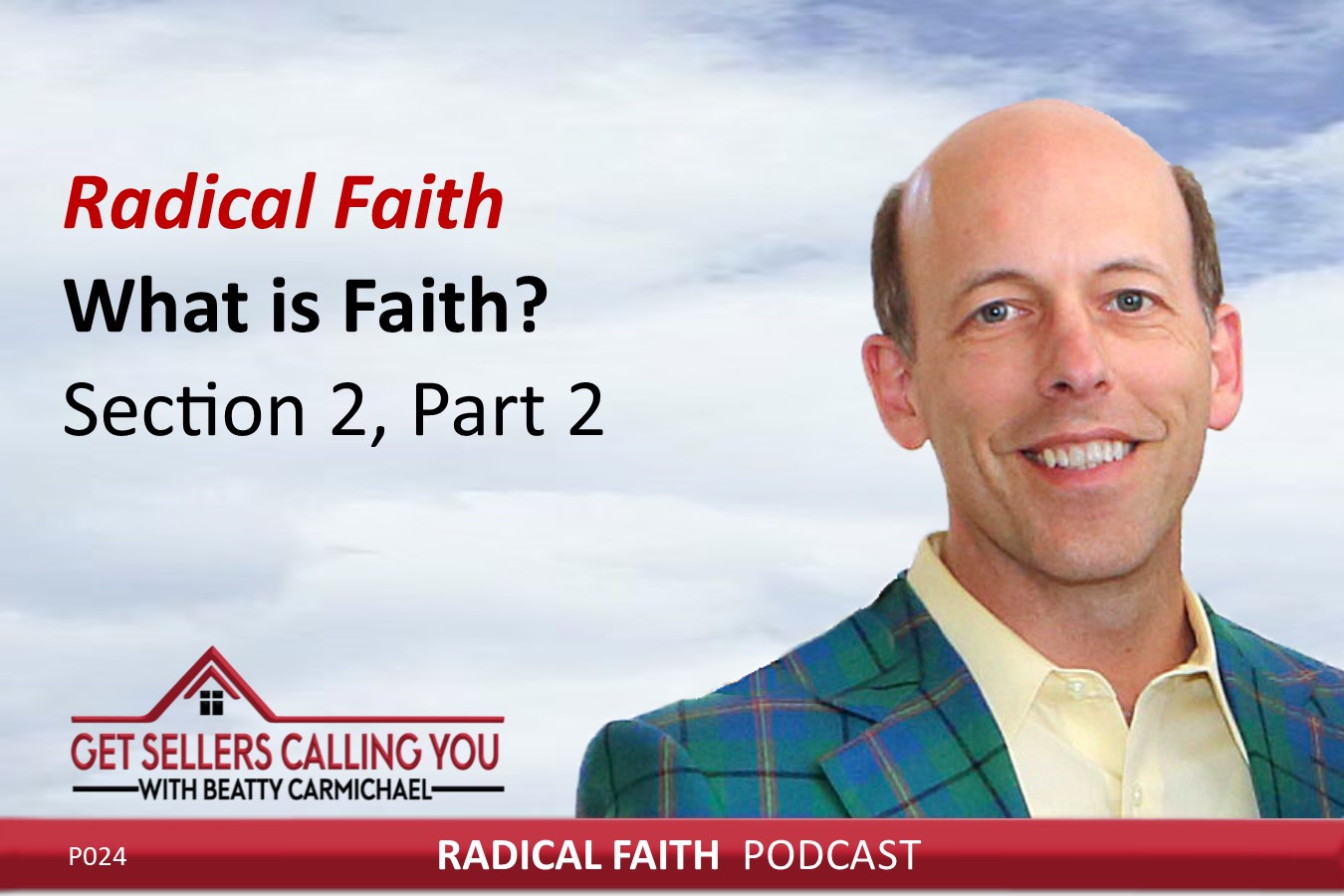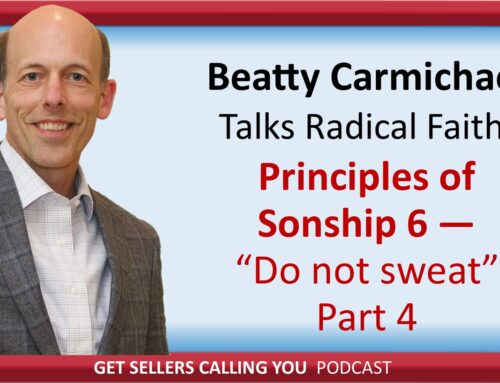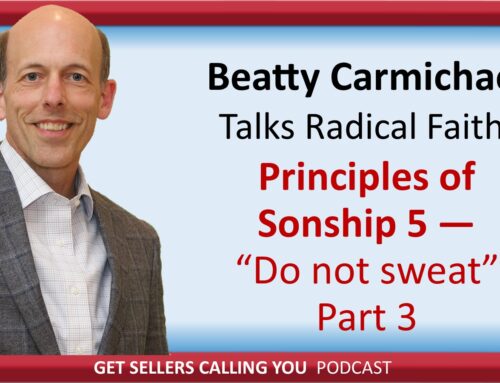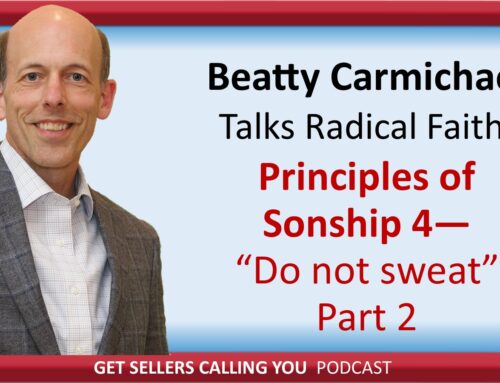Have Questions or Comments? Please ask your questions in the comments section below. We attempt to respond to ALL questions or comments.
Listen via YouTube video if desired
Caroline: Hi, I’m Caroline Springer and welcome to our next session of Radical Faith. We have a Radical Faith podcast as part of our Get Sellers Calling You podcast with Beatty Carmichael. Professionally, Beatty is the CEO of MasterGrabber, the creator of Agent Dominator and a top marketing expert in the real estate field for many years. And personally, for many years, he has been a Christian and loves to talk about the Lord and that’s where the vision of this podcast came from. So I’m just going to pass it over to him to give a little disclaimer about the Radical Faith podcast and kind of what his idea is behind it.
Beatty: I’m not sure I would call it a disclaimer, but maybe it is. The whole idea about Radical Faith is this has nothing to do specifically and directly with real estate business. It has everything to do with living your life as a passionate Christian. So this is all going to be about my Christian philosophy or theosophy if you call it that. So if you don’t want to hear it, you can delete this podcast out and just listen to the podcasts focused on how to build a real estate business, but we are going to talk about Christ today. That’s my disclaimer. Back to you.
Caroline: We always chat a little at the beginning about the world we live in and how we have to give a disclaimer, but I think it is good. It excites me so I’m like, “All right, let’s jump in.” This is going to be about the Lord and nothing else. So I’m okay with that.
Beatty: Part of that chat we were having is normal Christianity. So I definitely kind of want to bring that onto this call a little bit. The focus of these calls is what I call “normal Christianity.” If I were to ask you, Caroline, what do you think the typical Christian’s view of “normal Christianity” is? Is it healing the sick, raising the dead, casting out demons, doing miracles or is it being a good person, not saying curse words, going to church on Sunday and reading your Bible? What is normal Christianity?
Caroline: Yes, I would think sadly in the “normal” or maybe average Christian’s viewpoint, for those who claim to be Christian that’s what they would claim: being a good person, attending church, like you said, not saying curse words, living a chaste life, reading your Bible, praying before meals. The more Radical type of lifestyle is something that a lot of people may think is just preserved for certain people or that’s not really a thing anymore. I think that seems too far-fetched for them to believe that it’s something we’ve been invited into now.
Beatty: True. So let me ask you. Who is our model for how to live as a Christian?
Caroline: Jesus. He is our model.
Beatty: Did he consider what he modeled to be normal or to be radical? What do you think his perspective on it was?
Caroline: That’s a good question.
Beatty: Let me ask that question another way. He is modeling for us how we should live, right?
Caroline: Right.
Beatty: Does He expect us to live anything but what He considers normal?
Caroline: No. I think He was saying He only did the things He saw His Father do and he models for us a life like that so we can follow that. So I think His expectation was for Him to be paving a way for us to walk the way He walks. So I guess that would be normal for Him and normal for us.
Beatty: Okay, so then how did He walk? It says, I think in John 14:22, don’t quote me exactly, but somewhere in John 14. It says, “Truly, truly whoever believes in me will do the works that I do and greater works will he do because I go to the Father.” Jesus is living out the works that we should do. If I were to ask, “What were the works that Jesus did,” what would you tell me? Not saying curse words? Read the Bible? Or something different?
Caroline: I think something more. Like you said earlier, healing the sick, raising the dead, casting out demons, parting the way, making a way for Heaven to invade Earth. That was His life.
Beatty: Therein lies the topic of Radical faith. Most people think it’s radical. Jesus thinks it’s normal. Now we are not going to talk about today how to raise the dead or heal the sick. We might get into the sophics, but I think more than anything else it’s really understanding what we are called to do as a Christian. How are we called to live and those things that we consider in our 21st century nature to be radical, I think Jesus considered normal. How do we go back to what is normal and not what is myopically considered radical. That is where I want to kind of lean us into this call. Can I take the lead real quick and just kind of get this thing started?
Caroline: Absolutely.
Beatty: For those of you who have been listening in on our podcasts, you’ll kind of see this pattern. Caroline takes the lead in the interview process on the marketing stuff. I end up taking the lead on the radical faith stuff because she becomes my guinea pig just to use as a sounding board. On all the marketing calls, she has an outline of the direction we are going on the calls. But on the radical faith calls, she is totally blind, so she doesn’t know what I am going to bring up or what I am going to ask her. So we are going to put you on the spots a few times and see what your thoughts are. Okay?
Caroline: Oh, good.
Beatty: Oh, good. It’s just like normal. We are going to be normal on this call. The last call that we did on radical faith, we are been going through this series of what I call what is faith. We are trying to lay this foundation of what faith really means. On the previous call we started to talk about that faith comes hearing and hearing from the word of Christ. And then we started to look into that faith emanates from Christ. It emanates from His word. We then dissected the two most common Greek words that are translated into our English word: word. Those are… Caroline, do you remember those two Greek words by chance?
Caroline: Logos and rhema.
Beatty: Do you remember what the difference between logos and rhema are?
Caroline: Oh goodness. Wasn’t logos more like a word and rhema was more like something you received and heard?
Beatty: Exactly. So logos is simply a word that embodies an idea. In other words, Jesus goes out and preaches the Word to people. He is generally telling them truths. Rhema is when Jesus tells Peter: “Walk on the water.” Okay? Or tells Peter: “You will deny me three times before the cock crows.” Peter remember the word that Jesus told him. Or the angel that comes to Mary and says, “You are going to have a child.” And she says, “Be it done to me according to your word,” according to your rhema. Faith comes from hearing and hearing by the word or the rhema of Christ. So in our real loose definitions. This is not a scholarly definition, this is more what I would call a, “how do you live” definition. A loose definition of rhema is something that God points directly at you. A real simple kind of understanding, Caroline, have you ever (I know you have) been reading your scriptures, reading the Bible and a passage stands out like God is talking directly to you. Have you had that happened to you before?
Caroline: Absolutely. I have a lot of times where I will be in kind of conversation with the Holy Spirit. Later on, I will hear or read something in the Bible and it’s like the confirmation of what the Holy Spirit was just saying. There are a lot of times when things were highlighted. I feel like the Lord does that a lot for reassurance or confirmation.
Beatty: Well, He does that a lot with me too and when that happens that, in general, what we call rhema. That is when the Holy Spirit is speaking directly to you. That is where we were when we wrapped up our Radical faith call. What I want to do is pick up from there and kind of try to wrap up this section before we run out of time.
One of the things that we find about faith and this what I will call Radical faith is the idea or the truth that faith cannot exist by itself, that it is always accompanied by works. There is a passage in James, James 2:17 that says: “Even so faith if it has no works is dead being by itself.” So you kind of get this picture that faith cannot exist by itself. It’s sort of like the body without oxygen. It just dies. That body and oxygen have to go together. Faith and works have to go together. It says a couple of verses later. It’s talking about Abraham and it says, “Faith was working with Abraham’s works and as a result of the works faith was perfected.” So here is the question for you, Caroline. What does it mean that faith is perfected by works because, growing up in church, you always hear that we are saved by faith, not by works. Then we read this thing in James, you say you have faith but I have works and I’ll show you my faith by my works. So what is all this mean? What is the separation between faith and works? How would you describe that?
Caroline: To me, whenever I’ve had conversation with people about that with grace and works and how they all go together. To me, works comes as a natural outcome of your faith and what you believe. Your faith also partners with that to also give you the strength and belief to be the foundation of your works. So it’s not like your works are an outcome of striving but your works are an outcome of beliefs and trust and pursuing the Kingdom. It’s a completely trajectory comparatively with those that, maybe some people struggle with feeling like they have to prove and work their way to the Lord or earn their salvation, which we know, scripturally, is not true. But I think that is just the natural question to struggle with for a lot of people. I think God’s intention in James is that it doesn’t have to be something that is conflicting, it can be something that can actually partner a lot easier and your faith is going to naturally push the works and your works are naturally going to cause you to increase your faith.
Beatty: So let me see if I can make a real simple illustration to kind of tie this together. I want to invite you to a party. In fact, I am going to give this party in your honor. It’s going to be over at my house. It’s going to be Thursday night at 7:00. Can you come?
Caroline: Sure, yes, I’d love to.
Beatty: Is that a commitment?
Caroline: Yes.
Beatty: So now you have just given me your rhema. “I will be there.” So now, Thursday at 7:00 comes up and you are all excited because I’ve told you that we are going to get a caterer. We are going to invite all the people from church, all the people from the neighborhood and all the people from everywhere. And it’s going to be a great big party. And we are going to have child care so you don’t have to worry about Jethro and it’s going to be a wonderful time with your favorite foods and you are all excited. “This is my party.” Now you come over to the house. You come over at 7:00. You drive up to my house and you notice something strange. There are no cars out there. “Okay, well, I’m not sure what’s going on.” You have this question mark. You come up to the house and it’s kind of dark outside. There are no lights on. There are a couple of lights in the room but it’s not like it’s lite up. You look inside; there is no one there. You right the doorbell, ding dong. No one. You ring it again, ding dong. You are just about to walk away from my door and you hear these steps, boom boom boom, and it sounds like someone is coming up some steps and you see me running around the corner. I’m in my exercise clothes and I’m all hot and sweaty. I come to the door and open it. As soon as I catch your eyes, you see my expression go, “Oh my gosh!” You know that expression I’m talking about?
Caroline: Yes. I imagine that you are trying to say that you forgot.
Beatty: I didn’t forget. I say, “Oh my gosh, I’m so sorry. I didn’t think you would be here. I never made any plans for the party.” Now what happens to you at that point? Are you happy or are you sad?
Caroline: I imagine you would be sad and disappointed and questioning why you didn’t think I would attend.
Beatty: Yes, you would have all these questions. Did I just sin against you?
Caroline: That sounds so intense. I guess for the purpose of the illustration, yes?
Beatty: So here is what happens. Let’s now analyze this a little bit more. You gave me a rhema and I did not act in works upon that rhema. Do you follow me so far?
Caroline: Okay.
Beatty: Faith is perfected through works. Faith is what we believe in. Faith comes by hearing the rhema of Christ. So if we hear Christ’s rhema and don’t believe it then we never act on it and therefore faith is never perfected because our works did not carry it out. Make sense?
Caroline: Yes, that makes sense.
Beatty: So in this illustration, how can your faith be perfected by works? Because if I had faith that you would have shown up then my works would have demonstrated that faith. I would have called the caterer. I would have called all the people. We would be having a great party. We would have a special parking space right up front to protect a special parking area just for you just o you could come right to the front door. All of this. But the fact that I did none of it means that my faith was never perfected because I never believed it. It’s not that I work for my faith; it’s that my works emanate from my faith. So here are a couple of truths that we can learn about this. Number one, our works are a demonstration of our faith. We do not produce works to have faith. We generate works because it emanates from our faith. Faith comes first and faith naturally births the works in our lives because we become as we believe. As a man believes, so he is. In fact, I heard a preacher this past Sunday hit on that comment quite a few times. Do you remember anything like that?
Caroline: Yes, I do.
Beatty: So it all kind of ties together. And here are a couple of other things we can take out of this. So you come to the door and I go, “Oh my gosh. I didn’t believe you. I thought you were lying to me. Therefore, I didn’t make any plans at all.” Now you are feeling dejected and rejected. You are frustrated. “How dare you? I planned my whole week around this. It has taken two hours to prepare for this. I’ve been making myself look beautiful. I’ve been telling all of my friends.” Now you are really upset at my aren’t you?
Caroline: Yes, it sounds like I would be.
Beatty: Yes, you would be. What happens then is that you turn away. You hop back in your car and you drive home. And now I have lost the blessing of your presence and fellowship with you because I did not believe. Now, this is what the images between us and God are. When the Lord gives us rhema and I’m not talking about something huge like step off a mountain and I’m going to hold you up, okay? I’m talking about just anything where we fail to trust the Lord and we know that we don’t trust him because our actions prove that we don’t believe just like in that example. Then what happens is that all of God’s amazing blessings that he had in store for us fall through our fingertips and we don’t even receive them because they are only received by faith, not by works, but it’s our works that demonstrate our faith and therefore, that’s how our faith is perfected with works. Is all of this kind of making sense?
Caroline: Absolutely. I think that was a good step-by-step explanation with that scenario about the definition and how that works. It’s a funny scenario. I think it’s a great example and explanation.
Beatty: Okay, cool. So now let’s talk a little further on this, if we can. A simple takeaway. Your faith is always displayed by acting on God’s word. If you don’t act on it, you don’t really believe it. This is the essence of what I call “radical” faith. It should be normal. By the way, was there ever a time in Jesus’ life where He did not act in works based on His faith in what God had directed or told Him to do? Any time?
Caroline: No. A time when He did not act based on what the Father told Him to do? No, He didn’t.
Beatty: So when He raised someone from the dead, was that Him acting by faith?
Caroline: Yes.
Beatty: Okay. If we use this definition of faith. When He healed someone, was that acting by faith?
Caroline: Yes.
Beatty: And did He raise them from the dead? Did He heal them or was it the Holy Spirit doing that work?
Caroline: It was Him. The Holy Spirit came later.
Beatty: Matthew and Acts both say that it was the Holy Spirit working through Jesus that performed the miracles. Acts says that it was God’s power working through Jesus of Nazareth that did all of these miracles. In other words, that Jesus was modeling for us; this doesn’t take any of His Deity away, I’m just saying that the scripture says that the Holy Spirit is what raised someone from the dead. Healed somebody. We even see this in scripture that God commands, but it’s the Holy Spirit. You have God the Father as the ultimate authority and all power. He designates His authority to Jesus and then Jesus delegates authority to the Holy Spirit. In fact, Jesus says that the Holy Spirit will open your mind to all of these things and He will not speak anything to you that I have not commanded him already to speak. Are you with me or did I just lose you?
Caroline: No, I’m here.
Beatty: Maybe I’m going too deep in this. Let me pull back out before I get too deep. So faith is displayed by acting on God’s word. Jesus displays living by faith and, when you live by that faith, you act on His word then amazing things happen. I want to tell a personal story. We all kind of get caught into this because we get our eyes on the natural rather than our eyes on God. Jesus always kept His eyes on the Lord. He said, “Everything I do is what I see my Father doing.” He’s always looking at the Father first. Go back quite a few years, this is 2002. We are running and making a lot of money the first part of 2002. We’ve got a large corporate account that is scheduled to leave on June 1 and as soon they leave, we are going to be upside down. We are going to lose huge amounts of money, more money a month than most people will earn in a year. We hit June, we start to go upside down. The first month or two, I’m okay. By the third or fourth month, somewhere in there, I start to panic. Oh my gosh, I’m scared. Because I look in the natural. Just like Peter walking on the water, he looks at the wind and the waves and he gets scared. I’m looking in the natural; I get scared. We start to batten down all the hatches. Everyone is put on forced payroll reduction. I take the biggest cut of everyone. My number two man takes the second biggest cut and everyone else takes a bit cut as well. We are trying to weather the storm and we are losing money month after month. Now, it’s January 2003. Now, we’ve been unprofitable, losing money for about six months. Do you get the picture so far? It’s desperate, dire circumstances. Right?
Caroline: Right.
Beatty: So I’m out there on my day of prayer. I take a day off and say, “Lord, I am going to meet with you.” I’m out there. It’s now the end of January, just a couple of days before the end of the month and I’m on the golf course which is where I take my day of prayer. I don’t play, I just walk and pray and talk. I’m asking the Lord, “Lord, when are you going to let up? Do you know what the Lord told me? He asked me a question. “Do you really believe I can take care of you?” I said, “Yes.” He said, “If you really believe, how would you act differently than you are acting right now?” So what I said is, “Well, if I really believed it then I would put myself at full pay and I would put all my other people at full pay.” He said, “Then why don’t you do it and trust me?” Okay? This is what I’m talking about with radical faith. It makes no sense, but it is trusting the Lord. It is doing what Jesus said. Jesus trusted the Lord and He never feared. Why do we fear? Because we live in the natural. So I did. I put my eyes on Him instead of on the circumstances and I called my number two guy at the time, his name was Walter and I said, “Walter, put me and everyone else back at full pay, retroactive for the full month” because everyone had gotten a short paycheck midmonth. And so he did. Two days later, payroll hit. We lost a lot of money because that was a lot of money that we didn’t have. But here’s the cool thing. The very next month, we made a profit and this is a small business, we had a $20,000 swing on our bottom line, $20,000 more on our bottom line than we had the month before. And I looked at the P and L and I couldn’t find it even to this day, I’ve go back to that P and L multiple times and there is nothing there where we had a lot more revenue, less expenses. I don’t know how it happened, but it happened. And, for the next string of months, we were profitable. What changed? What changed in all that? Do you know?
Caroline: Your faith.
Beatty: Yes. I acted on my faith. Faith is perfected by works. That’s what this is meaning. So for those of you guys listening out there, what are you afraid of that you know God has said, “Trust me.” If you really believe God’s word to be true, how would you act differently than you are acting right now? And whatever that is, do it, because that is what James is talking about. Faith is perfected by works. Faith without works is dead. Therefore, you cannot believe unless you are going to show that belief through your works. Pretty fascinating isn’t it?
Caroline: It is. That was a really inspiring story too. I think it also makes a better definition of that verse and that challenge explaining how faith and works go hand and hand. They are not in opposition of one another.
Beatty: No, they definitely are not. We are going to go just a little bit over on this call but I have some points I want to wrap up with. So what faith really is, Caroline, it is seeing from God’s perspective. See, when Peter was walking on the water he was looking at Jesus seeing Jesus’ perspective and he was walking then he looked from His perspective into the waves and he gets scared. And in the very same situation he has two completely outcomes. One outcome by perfecting his faith through works. The other outcome by getting afraid and stop working by faith. Okay? The same thing happened with me, just reversed with the money. So when we see what God sees then we believe as God believes (if you want to use the term “God believes”). When we see as God sees then we get to believe as God believes and then when we act on that belief that is when our faith is perfected. And the challenge that we run into, and this is why it is so tough. Let me ask you a question instead of making a statement. Are we more spirit being or physical being? As a Christian?
Caroline: Spirit being.
Beatty: Okay. Where do we spend all of our time, focus and our sensory senses? Physical or spiritual?
Caroline: I guess physical
Beatty: Yes. So here is our problem. We are more spirit beings living in the spirit or should be, but where we actually live most of our time is in the physical because we have physical bodies. We have our sight, sound, hearing, everything, taste, touch is all physical. It’s easy to lose sight of spiritual truths because we get to see everything in the physical. This is where the challenge comes from. But if we can overcome and look in the spirit realm, both figuratively and literally. We look in the spirit realm figuratively and spiritually by looking at God’s truth and his truth trumps the physical. Okay? It is what it is. I want to give you some examples. I want to give you some passages and some scriptures and show you how this plays itself out in the scriptures.
The first one comes from 2 Kings, Chapter 6. This is Elisha and his servant. This is actually where we get the term “chariots of fire.” There is a battle with King Aram. King Aram is the enemy king and any time he makes a move against the Israel king then Elisha is telling the Israel king what is going on. So the Israel king gets to adjust. It may have been Judah, but I think it’s Israel. And now, that is where we pick up. “This enraged the king of Aram. He summoned his officers and demanded of them, “Tell me! Which of us is on the side of the king of Israel?” “None of us, my lord the king,” said one of his officers, “but Elisha, the prophet who is in Israel, tells the king of Israel the very words you speak in your bedroom.” “Go, find out where he is,” the king ordered, “so I can send men and capture him.” The report came back: “He is in Dothan.” Then he sent horses and chariots and a strong force there. They went by night and surrounded the city. When the servant of the man of God got up and went out early the next morning, an army with horses and chariots had surrounded the city. “Oh no, my lord! What shall we do?” (Just like me. On my goodness, we are losing money, what do I do?) the servant asked. And then Elisha, who sees from God’s perspectives says, “Don’t be afraid,” the prophet answered. “Those who are with us are more than those who are with them.” And Elisha prayed, “Open his eyes, LORD, so that he may see.” Then the LORD opened the servant’s eyes, and he looked and saw the hills full of horses and chariots of fire all around Elisha.
Here is the point on this, once the servant saw from God’s perspective, which is in the spiritual realm, he was no longer afraid. Does that make sense?
Caroline: Yes, that does.
Beatty: Let me give you another example. Say it’s the 27th of the month, and this is personal for you and Wes, it’s the 27th of the month and you guys have $2,000 of bills needing to be paid and you don’t have the money. You don’t know where it is going to come from. You’ve run out of money for the month and you still have $2,000 left to pay. And this is critical. Maybe this is your mortgage. Okay? You are at risk of losing the house if you don’t pay it. So you are going to pray and ask the Lord to help you out, is that right?
Caroline: Right.
Beatty: Okay. So when you pray and ask God to send it, how solid is your faith that He is going to send you that money in the next two or three days?
Caroline: Pretty solid because we just seen Him be faithful time and time again. He’ll be faithful again.
Beatty: Let me ask you, would you put Jethro’s life on it? Do you believe it that much?
Caroline: That such an intense question. I don’t know that the Lord would ask me that.
Beatty: I know He wouldn’t but the question isn’t, how much do you really believe? Do we believe in essence, trusting that He is going to do something or do we have an absolute, unequivocal, absolutely $2,000 is going to show up in the mailbox or someone is going to bring it to me within the next two or three days.
Caroline: That’s a good challenge to ask yourself.
Beatty: I’m leading somewhere. I’m always leading somewhere with these questions. So the question is, we pray and we ask, but do we really believe. We trust, but do we really believe that $2,000 is going to how up in the mail in the next two days? Okay. So now, let’s look at it from God’s perspective for just a moment. One month ago, your mortgage company paid your taxes your taxes and insurance out of money from escrow. And they realized that they collected $2,000 more from you over the last year than was needed. So they processed a $2,000 check. It was mailed two days ago and you are about to get it today. Okay? That is God’s perspective. You know that that check is coming. You know all these details. Now when you pray and ask God for $2,000 do you have a different level of confidence that he is going to provide it.
Caroline: Absolutely. You would have the whole scope.
Beatty: So what changed?
Caroline: You were placing yourself in Heaven’s perspective to see where the Lord is coming through. When you have the whole scope, your prayers change. You have faith and confidence. You can see that He will be faithful and He’s coming through.
Beatty: In God’s perspective, everything changes. I think we talked about this a few times back that it’s all about seeing from God’s perspective. That’s what I am talking about here. This radical faith is seeing from God’s perspective. Elisha’s faith was not scared at all because he could see from God’s perspective. Once God opened the servant’s eyes to see from his perspective as well, he was no longer afraid. When we get our eyes focused on the natural, we become afraid. When we keep our eyes focused on the Lord and his truth, which is His perspective, then if we believe it, we are no longer afraid ourselves. The only way that we can demonstrate our belief is to act on it. That’s kind of how all that works. So that’s what faith is. Next time we will start on the topic I call, “Getting out of the boat.” We are laying the foundation now and now the next set of calls we going to start to get where the rubber meets the road and it’s going to be a lot of fun. You want to close us out real quick?
Caroline: Sure. Well Beatty, thank you so much for your time and sharing all the revelation and wisdom that you received from the Lord. I think this really was a great and challenging call. I’m excited to hear next time about getting out of the boat and just continuing on in our conversation. I think we are going to wrap up. I don’t think we are doing a question and answer for this call. With that being said, Beatty, if you don’t have anything else, I think we are wrapped up. That’s all we have for today.
Beatty: Great. Thanks a lot. Y’all have a great day.
P024








Leave A Comment